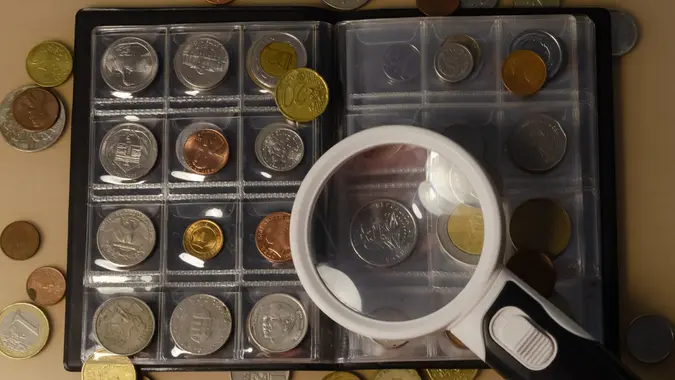4 Mistakes To Avoid If You Find an Old Coin or Bill That Could Be Valuable

Commitment to Our Readers
GOBankingRates' editorial team is committed to bringing you unbiased reviews and information. We use data-driven methodologies to evaluate financial products and services - our reviews and ratings are not influenced by advertisers. You can read more about our editorial guidelines and our products and services review methodology.

20 Years
Helping You Live Richer

Reviewed
by Experts

Trusted by
Millions of Readers
Let’s say you’re clearing out your parents’ or grandparents’ attic and you happen to spot a box full of coins. Or maybe you’re shopping at the secondhand store when you spot a unique piece of paper money. Regardless of where or how you’ve found them, you now have some potentially high-value coins or bills in the palm of your hand. What should you do about it?
One of your first moves should be to find a reputable coin dealer or collector and ask for their input. However, according to Donn Pearlman, spokesman for the Professional Numismatists Guild, there are a few things you should absolutely not do before you can get your coins evaluated. Here they are below.
Cleaning the Coin
If there’s a little bit of grunge or other evidence of time on your coins, you might be tempted to give them a deep cleaning to put their best faces forward to the dealer. But you’d be wrong. Pearlman says to put the steel wool down.
“The first advice I always give anyone who thinks they may have a rare coin is do not clean it,” he said.
Pearlman added that abrasive cleaning can damage coins and significantly lower their value to collectors. “A $1,000 silver dollar can suddenly become a $100 coin if a kitchen scouring pad has been used to make it bright and shiny.”
However, he told us that there are professional conversation services, including the Numismatic Guaranty Company, who can handle cleaning appropriately.
Getting Your Fingerprints All Over It
While you might enjoy the weight of the coin in your palm, don’t make a point of rubbing your fingers along it.
“It is best to always carefully handle valuable coins only on the edges to avoid putting fingerprints or skin surface oil on the front (the obverse) or back (the reverse) of the coins,” said Pearlman.
Folding Paper Money
Should you find a piece of paper money, you might be tempted to fold it up and tuck it away in your wallet for safekeeping. Pearlman advised against following that temptation, saying that if you come across a potentially rare piece of paper money — specifically one with mismatched, upside down or even serial numbers — you should not fold it.
“Creases will lower the value. If the note has already been folded, don’t add more creases,” he said.
‘Winging It’ When It Comes to Getting Your Money Evaluated
Above all, Pearlman said you don’t have to go it alone when it comes to understanding how much your coins or bills are worth. He shared that you should absolutely seek an expert’s opinion.
“Members of the Professional Numismatists Guild follow a strict Code of Ethics in buying and selling numismatic merchandise,” he said. “The PNG’s motto is ‘Knowledge and Integrity.'”
More From GOBankingRates
 Written by
Written by  Edited by
Edited by 

























